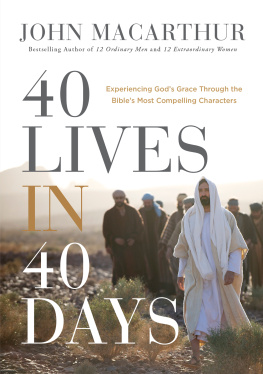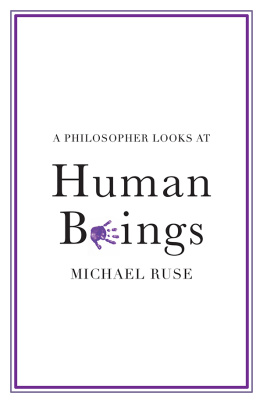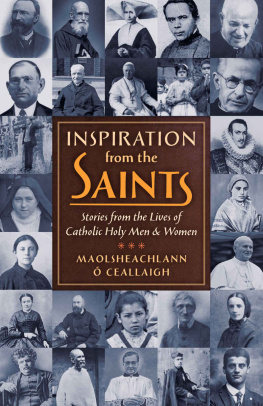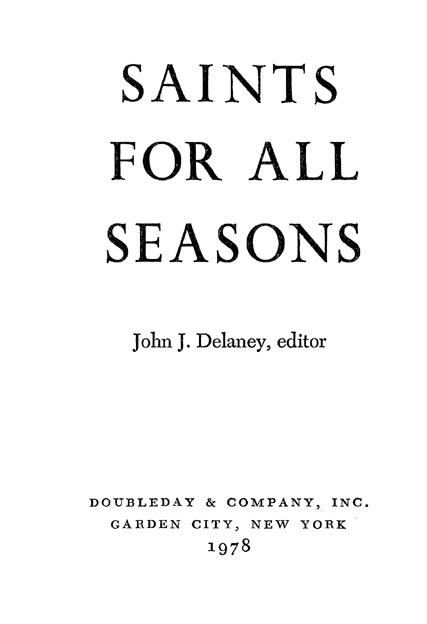eISBN: 978-0-307-81736-5
Library of Congress Catalog Card Number 7781438
Copyright 1978 by John J. Delaney
All rights reserved
Copyright 1934, 1951, 1962 by Ruth Shaffer, Moses Asch,
John Asch, and the representative of Nathan Asch
Library of Congress Catalog Card No. 68-25867
BVG 01
v3.1
Grateful acknowledgment is made for permission to include excerpts from the following copyrighted publications:
Excerpt from St. John of the Cross: His Life and Poetry by Gerald Brenan. Reprinted by permission of Cambridge University Press.
Crucifixion from Spirit Magazine. Reprinted by permission of the publisher.
To
My one loveAnn
who never believed the saints could ever be irrelevant
Contents
M ARY
Mary Carson
J UDE
Donald J. Thorman
P ETER
Barrett McGurn
P AUL
E. E. Y. Hales
A UGUSTINE
Anne Fremantle
P ATRICK
Gary MacEoin
T HOMAS B ECKET
Joel Wells
D OMINIC
Tere Rios Versace
F RANCIS OF A SSISI
John S. Kennedy
J OAN OF A RC
Candida Lund
T HOMAS M ORE
Dan Herr
I GNATIUS L OYOLA
John B. Breslin, S.J.
T ERESA OF VILA
Mary Purcell
J OHN OF THE C ROSS
Thomas P. McDonnell
F RANCIS DE S ALES
John Deedy
V INCENT DE P AUL
Julie Kernan
A NNE-MARIE J AVOUHEY
Glenn Kittler
A NTHONY C LARET
Robert E. Burns
T HRSE OF L ISIEUX
Naomi Burton Stone
T HE U NKNOWN S AINT
Fulton Oursler, Jr.
Introduction
Through the centuries, veneration of the saints has been a prominent feature of life in the Church. From the earliest days of Christianity men and women of great holiness have been honored by their fellow Christians for the lives they have lived and the example they have set in their quest for a spirituality that would bring them close to God in this life. These holy Christians have come from all walks of life, from lowliest beggar to all-powerful emperor, king, or queen. For just as Christ preached the good news of salvation to all, so, too, those who followed his example in their lives and have been proclaimed holy have come from all walks of life.
It is an unfortunate fact of modern life that along with other worthy practices the veneration of saints in contemporary times has fallen if not into disrepute at least into disuse. No longer do the saints have the hold and impact on us that was so prevalent as recently as a decade or so ago.
The reasons for this state of affairs are not too difficult to understand, though one does not have to agree with them. The skepticism and cynicism of the 60s have left a deep mark even on those who never assented to the philosophy of that embittered and disillusioned decade. The novel idea advanced then that the now was all and history had nothing to offer since all knowledge had been instantaneously acquired now had subconscious effects on all in view of the undeniably amazing accumulation of information in the twentieth century (the accumulation of wisdom is something else again). The study of history and philosophy declined, as subjects that had nothing to offer to todays students. With this trend went an increasing lack of interest in historical figures and what they had to offer. The saints were only one of a group affected by this attitude.
Also, it is true that there are many saints whose activities are simply unbelievable to one living in the twentieth century. They are products of their times, incomprehensible without an intimate knowledge of the customs, practices, and culture of the times in which they lived. Even with such information, we often find it difficult to understand what they did. And lets face it, some of the actions and some of the miracles attributed to some of the saints are simply ludicrous, a concoction of myth and the vivid imagination of fevered followers. Few people fully realize that the painstaking process and scrupulous, scientific investigation required for a modern canonization is of comparatively recent origin; many saints of early times were so proclaimed by small local cults with no attempt at all at impartial study of the claims advanced. Small wonder that so many, particularly younger people, dismissed the whole lot as not worthy of any attention at all, much less of respect, emulation, and even veneration.
This loss of respect for the saints is a great pity, for there are saints whose lives and activities can be of great value to all. The attitude toward the saints today reminds me of the attitude toward spiritual reading that prevailed just a few short years ago. Fed up with so much of the pious pap that passed for spiritual writing in the 30s, 40s and 50s, people just stopped reading all spiritual works, including the great Christian classics. As time went on, people realized that they had thrown out the baby with the bath water. Today, truly authentic spiritual writing, including or, better said, led by the great Christian spiritual classics, is more popular today than at any other time in this century, as people have again discovered the timeless treasures of Augustine, Teresa of vila, John of the Cross, Thomas Kempis, and the other giants of Christian spirituality. For truly great spirituality transcends time and geography, was valid in past centuries, is valid now, and will be in centuries ahead.
And so it is and will be with the saints. Some saints are just not appropriate for today. Some are merely local cult figures who have never been subjected to the rigorous scrutiny that the Church today requires for canonization. Some were built up by unscrupulous promoters. Some are products of a culture foreign to our own. But remember, no one is obliged to venerate any saint he or she does not wish to. The Church has never declared the veneration of any saint a matter of faith, necessary for salvation. What she does say in canonizing a saint is that the person declared to be a saint is worthy of veneration. Indeed objections to the saints included in the calendar of the saints are minuscule compared to the uproar caused when Church authorities attempt to remove saints from the official calendar, as witness the resentment expressed a few years ago when certain saints were removed because information about them was too scanty or was unauthenticated!
But if there are saints not appropriate for todays believers, there are many whose example and lives are still most appropriate for the chaotic and disturbing age in which we live. Just as in the literature of spirituality there are works whose intrinsic merits are such as to have universal and timeless appeal, so there are saintly individuals who offer inspiration and whose lives can serve as examples for us today just as they did in their own times. We are so wrapped up in the complex problems of todays world that we have a tendency to overlook the fact that men and women have faced many of those same problems, though in different settings, in other times. The wisdom and insights they applied to face those challenges are still fresh and relevant today. Knowledge changes as we expand our horizons, but true wisdom is timeless and universal.
Ah, yes, there are things we can learn from the past, and who can better be of assistance to us in facing the spiritual and even material dilemmas that constantly confront mankind than those saints whose complete trust in God has always provided guidance and inspiration? Saints for all seasons? Of course there are.











